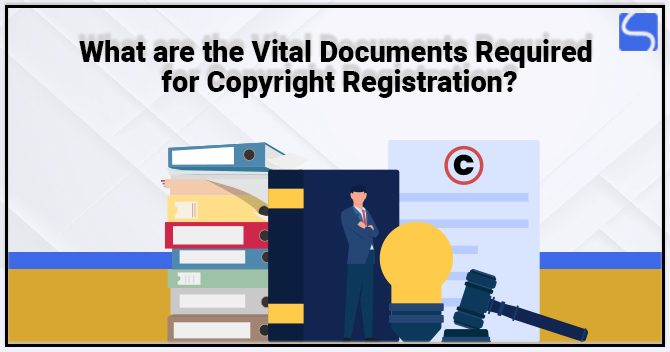Copyright Registration in India: Mandatory or Not

Shivam Narwal | Updated: May 01, 2023 | Category: Copyright
What if you decide to write a new novel? It is a masterpiece of literature that might fetch you a lot of money, but you are afraid of what will happen if people replicate it and sell it under their own name after you release it? What steps should you take to avoid this and defend your rights? The solution is straightforward. You must register your work with the Copyright Registrar. Copyright is a legal privilege granted to producers of creative works in the fields of literature, drama, music, art, and so on. A registered copyright protects your work legally and forbids unlawful use of it. Such rights may be exercised by the owner or by anyone who has been duly licenced by the owner of the copyright. This blog will explain if copyright registration is required in India.
Table of Contents
Benefits of Copyright Registration
Let us look at some of the advantages of registering your work for copyright:
- It enables you to alter the format of your work. It enables you, for example, to create a sequel, rewrite, or update the work.
- It allows you to sue and take action in court against an individual who violates your copyright, such as publishing reproductions of your creation without authorization from you.
- A public record is made when a copyright is registered. It allows someone looking to licence your work to discover you while also letting the world know that your work is copyright protected.
- By allowing you to utilise your work in a variety of ways—including creating copies, giving public performances, broadcasting your work—and receiving the proper compensation for it, it offers you financial advantages. As a result, it pays you for your creativity.
- It enables you to obtain official proof of your ownership. So, if someone forbids you from using your work, all you have to do is use your copyright to demonstrate that it was created by you and that you have the right to use it.
Important Documents needed for Copyright Registration
There are certain unique criteria for various types of work, however the following are the general needs:
- If the work is published, 3 copies must be made.
- Two manuscript copies should be sent if the work is not published.
- Authorization in relation to work, even though the applicant did not do the work
- If a lawyer is filing the application, a specific power of attorney or vakalatnama must be signed by both the lawyer and the party.
- Name, residence, and nationality information about the applicant
- information about the work’s title and language
- Email ID and personal contact number of the applicant
- A NOC from the publisher is necessary if they are not the applicant.
- If the work has been published, the year and initial publishing address must also be provided.
- If a copyright claim relates to software, source code and object code are also necessary.
Procedure for Registration of Copyright in India
The registration process of a copyright is pretty simple. Follow the steps mentioned below to ensure a copyright registration:
- Apply for a licence at the copyright office in person, via mail, or online using their website.
- Submit the application fee, which differs according on the type of work being copyrighted.
- Give the copyright examiner at least 30 days to review the application.
- If no complaints are received, the examiner checks the application for errors. If errors are discovered, the applicant will be notified and given the opportunity to correct the situation.
- If any objections are raised, the registrar will hold a hearing to determine the matter.
- The registrar will record the information in the register of copyrights and issue a certificate of registration if the copyright claim is accepted.
- A copyright symbol, along with the applicant’s name and the year of publication, may now be used to indicate that their work is protected by copyright law.
Is Copyright Registration Mandatory in India as per the Courts?
Regarding whether copyright registration is necessary in India, there is a lot of misunderstanding. The following are lessons learned concerning whether copyright registration is required in India from several court judgements:
- The Bombay High Court emphasised that the registration of copyright is not necessary for enforcement by looking at numerous rulings, the TRIPS Agreement[1], and the Berne Convention.
- In Dhiraj Dharmadas Dewani vs. Sonal Info Systems Pvt Ltd., the Bombay High Court determined that a copyright owner must register their copyright before pursuing any civil or criminal remedies under the Copyright Act. In simple terms, the copyright office must be notified in order to file a complaint about a copyright violation.
- Numerous court rulings have made it clear that copyright protection is automatic once the work is finished and registration is not necessary to obtain it, despite some confusion regarding whether registration is necessary for enforcement. But by registering the copyright, the author can demonstrate ownership and lessen the likelihood of infringement.
- According to the court, copyright protection is automatic once the work is completed, so registration is not necessary to obtain it.
- In the instance of an unregistered copyrighted work, the law maintains that ownership belongs to the individual claiming to be the original owner. In the event of a disagreement, the burden of proof rests with the party challenging the claimant’s ownership. Because of this, copyright appears to be a significant sort of intellectual property rights that a poet or a rural craftsman may both benefit from.
- Registered copyrights have fewer odds of being compromised than unregistered ones, even though there is a potential that they can be sold, duplicated, or performed.
Though it is not required to register for a copyright in India, you should do so if you want protection and think your work is valuable. After that, you need to file a copyright claim. You’ll be granted exclusive rights and safeguarded from any infringing behaviour.
Conclusion
In India, copyright registration is not required, but it has many benefits, such as anti-infringement protection, cash rewards, ownership proof, and the capacity to amend the work. Authors and other creators can protect their work and stop unauthorised use of it by registering their creations for copyright. Additionally, it gives the author legal protection and stops others from stealing or reselling their work without their consent. Numerous court rulings have made it clear that copyright protection is automatic once the work is finished and registration is not necessary to obtain it, despite some confusion regarding whether registration is necessary for enforcement.
Read our Article:Why is Copyright Registration Required in India?













